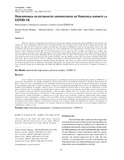| dc.rights.license | http://creativecommons.org/licenses/by-nc-sa/3.0/ve/ | es_VE |
| dc.contributor.author | Paredes Márquez, Yorman | |
| dc.contributor.author | Sánchez, Mariana | |
| dc.contributor.author | González, Alexy | |
| dc.contributor.author | Lobo, Sandra | |
| dc.contributor.author | Chipia Lobo, Joan Fernando | |
| dc.contributor.author | Giatti, Leandro Luiz | |
| dc.date.accessioned | 2024-01-16T11:33:00Z | |
| dc.date.available | 2024-01-16T11:33:00Z | |
| dc.date.issued | 2024-01-16 | |
| dc.identifier.uri | http://www.saber.ula.ve/handle/123456789/50142 | |
| dc.description.abstract | Con el objetivo de analizar la desesperanza de los estudiantes universitarios en Venezuela durante e l COVID-19, se realizó esta investigación, con enfoque cuantitativo y diseño transversal no experimental, utilizando la Escala de Desesperanza de Beck. La muestra estuvo conformada por 237 estudiantes universitarios mayores de edad, que mostraron disposición a responder las interrogantes planteadas en dicho instrumento y dieron su consentimiento informado para el uso de la información facilitada mediante un Formulario de Google creado al efecto, el cual permaneció abierto desde el 18 de mayo de 2020 hasta el 18 de agosto del mismo año. Las variables investigadas fueron: género, edad, región de procedencia, universidad, carrera y desesperanza. Los resultados reportaron 66% de género femenino y 34% masculino, adultos entre 18 y 59 años, (X= 26,45 ± 8,96 años). En cuanto al nivel de desesperación, 21,3% fue leve, 77,0% moderada y 1,7% severa. Se encontraron relaciones entre los niveles de desesperación y género (p=0,019), y el número de veces que sale de casa (p=0,024); cuando no puede dormir utiliza algunos dispositivos como: computadora, celular u otros (p=0.023). Existe un impacto psicológico negativo asociado a situaciones estresantes e inesperadas durante la pandemia, ya que tres de cada cuatro estudiantes presentaron un nivel moderado en la Escala de desesperación de Beck. Además, se encontraron relaciones con el género, siendo más afectadas las mujeres; sin embargo, se presentaron casos severos en los hombres y se encontró relación con la dificultad para dormir y el uso de algunos dispositivos: computadora, celular u otros. | es_VE |
| dc.language.iso | es | es_VE |
| dc.publisher | Comunidad y Salud. Año 2023; 21(2) Jul-Dic | es_VE |
| dc.rights | info:eu-repo/semantics/openAccess | es_VE |
| dc.subject | salud mental | es_VE |
| dc.subject | desesperanza | es_VE |
| dc.subject | estudiantes universitarios | es_VE |
| dc.subject | COVID-19 | es_VE |
| dc.title | Desesperanza en estudiantes universitarios de Venezuela durante la COVID-19 | es_VE |
| dc.title.alternative | Hopelessness in Venezuelan university students during COVID-19 | es_VE |
| dc.type | info:eu-repo/semantics/article | es_VE |
| dcterms.dateAccepted | 10 de octubre de 2022 | es |
| dcterms.dateSubmitted | 01 de agosto de 2022 | es |
| dc.description.abstract1 | With the objective of analyzing the hopelessness of university students in Venezuela during COVID-19, this research was carried out, with a quantitative approach and a non-experimental cross-sectional design, using the Beck Hopelessness Scale. The sample was made up of 237 university students of legal age, who showed willingness to answer the questions posed in the said instrument and gave their informed consent for the use of the information provided through a Google Form created for this purpose, which remained open from May 18, 2020 until August 18 of the same year. The variables investigated were: gender, age,
region of origin, university, career and hopelessness. The results reported 66% female and 34% male, adults between 18 and 59 years old, (X= 26.45 ± 8.96 years). Regarding the level of despair, 21.3% was mild, 77.0% moderate and 1.7% severe. Relationships were found between levels of desperation and gender (p=0.019), and the number of times they leave home (p=0.024); When they can't sleep, they use some devices such as: computer, cell phone or others (p=0.023). There is a negative psychological impact associated with stressful and unexpected situations during the pandemic, since three out of four students presented a moderate level on the Beck Despair Scale. In addition, relationships with gender were found, with women being more affected; However, severe cases occurred in men and a relationship was found with difficulty sleeping and the use of some devices: computer, cell phone or others. | es_VE |
| dc.description.colacion | 42-52 | es_VE |
| dc.description.email | paredesy@usp.br | es_VE |
| dc.publisher.pais | Venezuela | es_VE |
| dc.subject.facultad | Facultad de Medicina | es_VE |
| dc.subject.keywords | mental health | es_VE |
| dc.subject.keywords | hopelessness | es_VE |
| dc.subject.keywords | university students | es_VE |
| dc.subject.keywords | COVID-19 | es_VE |
| dc.subject.thematiccategory | Medicina y Salud | es_VE |
| dc.subject.tipo | Artículos | es_VE |
| dc.type.media | Texto | es_VE |
| dc.contributor.orcid | http://www.orcid.org/0000-0002-0319-7641 | es |
| dc.contributor.orcid | http://www.orcid.org/0000-0002-2475-9922 | es |
| dc.contributor.orcid | http://www.orcid.org/0000-0002-8393-2975 | es |
| dc.contributor.orcid | http://www.orcid.org/0000-0003-4130-7968 | es |
| dc.contributor.orcid | http://www.orcid.org/0000-0001-6365-8692 | es |
| dc.contributor.orcid | http://www.orcid.org/0000-0003-1154-6503 | es |


